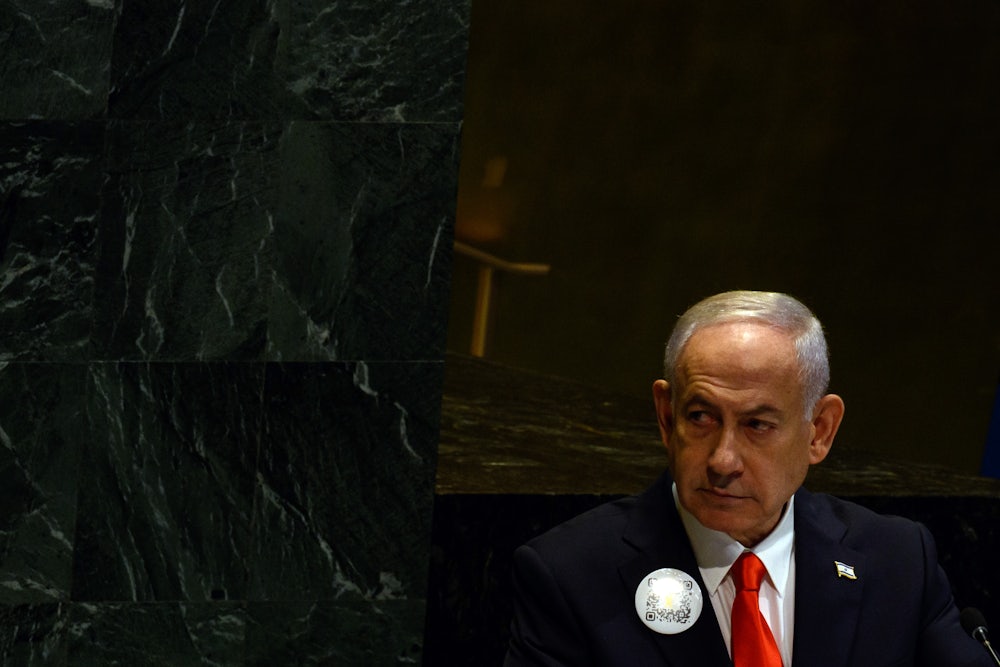It’s so often said that it’s become a cliché in modern politics: Israel has been the Jewish homeland for 3,000 years or more. Modern Israel, they say, is heir to the ancient kingdom of David and Solomon—fruit of an ancient covenant between Abraham and God.
“The Jewish people have lived in … what is now the state of Israel, have lived here and have been attached to this place for about 3,500 years,” Israeli Prime Minister Benjamin Netanyahu told pseudo-intellectual Jordan Peterson on a 2023 podcast.
“This is our deed to the land,” former Israeli Ambassador Danny Dannon said in 2019, waving a Bible at the members of the United Nations Security Council. “The Bible paints a consistent picture. The entire history of our people, and our connection to Eretz Yisrael, begins right here.”
There’s just one problem—if you actually ask biblical scholars, many will tell you: Israel’s history isn’t nearly so settled as Zionists would like you to think.
“I wouldn’t say that there is a consensus,” said Gili Kugler, a senior lecturer of biblical studies at the University of Haifa. “It’s the ideology that drives the interpretation.”
For the last century, historians, philologists, and archaeologists have been critically examining narratives about Israel in the Bible, searching for evidence of their historical reality. But the last thirty years or more of critical scholarship have turned up a notable lack of evidence supporting the foundational narratives of the ancient Kingdom of Israel, supposedly in existence for a little over 100 years at the turn of the first millennium BCE.
“We have absolutely no evidence about the existence of that kingdom,” said Ambra Suriano, a postdoctoral researcher in politics, philosophy, and religion at Lancaster University. “Very likely, it is a narrative which has been constructed after the return from exile in Babylon … after the sixth century [BCE].”
But you wouldn’t know that reading the vast majority of references to ancient Israel outside the niche discipline of biblical archaeology. In the journal Politics, Religion, and Ideology, Suriano collects some of the most egregious examples of celebrated experts in departments of Israel Studies and International Relations treating the existence of an ancient Kingdom of Israel as an accepted fact. “Some of them do not seem fully aware of the history of research in this field or, on the contrary, choose to ignore it, carrying on a nationalist narrative of ancient history, leaning on an outdated reconstruction of the past,” she writes.
For some time, the issue of ancient Israel’s existence was a hotly contested one within the field of biblical archaeology, which traces its origins to an evangelical Christian project to prove the historical existence of Jesus Christ. “They [were] not really interested in discovering an ancient civilization,” said Emanuel Pfoh, a researcher in biblical history at the University of Helsinki. “They [were] interested in discovering the origins of their own Protestant civilization.”
But with the creation of modern Israel in 1948, that project took on a new ideological significance. With the support of evangelical Christian institutions in the United States and Europe, early Zionist scholars worked hard to build a body of academic literature that asserted an incontrovertible historical connection between the Jewish people, the ancient Kingdom of Israel, and the modern Israeli state.
“With the renewal of the homeland and Hebrew independence … we [have] been able to reassess the Bible in its true, full light,” Israel’s first prime minister, David Ben-Gurion, wrote in 1953.
The narrative of modern Israel’s inheritance of the ancient Davidic kingdom became a cornerstone of secular Israeli identity, according to Anita Shapira, an Israeli historian at Tel Aviv University, with the Bible stories of Israelite victories supplanting even the Talmud in cultural importance.
At the same time, Zionist extremist groups like Gush Emunim, active from the 1970s to the late 2000s, used this narrative as the grounds for a campaign to settle “Eretz Yisrael,” the mythological domain of David and Solomon extending well into modern-day Syria, Lebanon, and Egypt, and erasing today’s Palestinian territories.
As evidenced by Dannon’s speech at the U.N., the idea of Eretz Yisrael still holds currency among many Zionists today—despite biblical scholars arguing, since as far back as the 1970s, that there is no evidence to suggest such a kingdom ever existed.
“All signs of a large and prosperous capital of the Davidic Solomonic era are completely missing,” the biblical historian John Van Seters wrote, nearly two decades ago. “All indications are that [ancient Jerusalem] was a rather small town of not more than a thousand inhabitants.”
Since the 1990s, Pfoh says, those critical perspectives have been expanded upon by a community of mostly European researchers, who have worked to push back on the earlier, ideologically motivated scholarship that took the historical accuracy of biblical narratives for granted.
These so-called “biblical minimalists”—today seen as a derogatory term—have been derided as antisemites for questioning the earlier conclusions of American and Israeli scholars. But time has seen many of their positions on ancient history adopted as mainstream within biblical studies.
Not so, however, outside their narrow academic circle. Within Israel, the Zionist narrative of ancient history is still widely taught. “[Israeli education] wants to be very progressive … and it is free, and critical, until you get to … the land of Israel,” said Nurit Peled-Elhanan, an Israeli philologist and outspoken critic of Israeli education. “There, critical thinking doesn’t work anymore.” Today, she said, “most Israelis don’t believe in God, but they are sure he gave them the land.… They treat it as scientific fact.”
This has been the case, too, in the growing body of scholarship referencing the history of Israel emanating from conservative theological colleges and other institutions in Israel and the United States. “Historiography tends to go like a pendulum,” Pfoh said. “Now, the pendulum is going to the right, into a more conservative reading of the Bible.
“You find it harder to get critical opinions, or funding, or grants,” said Pfoh, “because the pendulum is back to people want[ing] to know about ancient Israel, not ancient Palestine.”
That’s why historians like Suriano are calling for greater dialogue across these many disciplines—and with the public—to make sure the findings of the last 30 years of biblical studies don’t end up buried in a mountain of ideological bullshit.
“We cannot read [the Bible] as a historical document,” she said. “[Being] more accurate, when it comes to ancient history, means you are open to questions instead of answers.”
Shaul Magid, a rabbi and professor of modern Jewish studies at Harvard Divinity School, was optimistic about the possibility for dialogue. “Israeli scholars are now much more open than they have been … to the idea that we can’t understand this period without other disciplines,” he said.
For Magid, that means treating the Bible’s history of Israel as part of a literary corpus, motivated by the concerns of its own time—for example, sixth-century BCE Persia—and not as an accurate chronicle of historical events.
But others adopt a less rosy view. Today, the topic of ancient Israel is more heated than ever. Some biblical archaeologists told me that when they present their research at conferences, they are more likely than ever to have to face down angry outbursts. They even find themselves walking on eggshells when discussing the topic within their own departments.
Meanwhile, projects are still being funded in partnership with American theological colleges and Israeli institutes with a clear ideological motivation behind their research. Those at the top, my sources told me, would rather not rock the boat. All that means, no matter what the experts say, the Bible’s version of history is likely to hold out a little longer.










